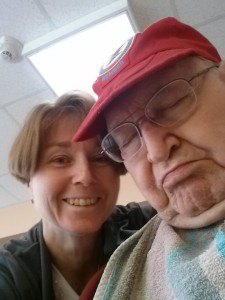I was talking to a friend the other day about family, and about the trainwreck that is my immediate family. I don’t know if some of the siblings talk to each other, but I know a lot of us don’t. I’m not even sorry about that, at least not any more. I feel like I tried. I know some of the what went wrong and how, but I am also sure I don’t get all of it. One thing I know is that I don’t have to stay in the middle of this mess and let it keep hurting me. I have an obligation to do what I can for Dad, as best I can, until he passes, which means some limited interaction with the others, as required. Then it is time to move on.
I wonder sometimes what my parents and my Dad’s first wife were thinking. Surely you don’t go into it thinking you are going to have kids that are never going to care to speak to each other again when they grow up. I can remember my mother trying to micromanage my relationship with my younger brother. It never worked. She never stopped. I know she’s a lot of the reason for tension with the older kids, and with very good reason.
One thing I do know is that you cannot create relationships for other people. You can, if you are the authority figure, create an environment in which healthy relationships are possible. You do this by creating a community of respect for individuals and differences. You do this by leading by example. You do this by respecting and valuing the other members of the family or community, and trusting them, by and large, to figure things out and do what’s right. To want to do what’s right.
You have to love and respect yourself, with all your flaws and weaknesses. Everyone has these. If you can’t love your vulnerable, imperfect self, you will have a hard time teaching anyone else to love themselves. And if you don’t love yourself, it is mighty difficult to love someone else.
I wonder sometimes how it is for my siblings’ kids. I think it is better and healthier than it was for us, and I hope they have better relationships between siblings and cousins than I have had.
I am often sad that I never had a family. Sometimes a small voice whispers that maybe it is a good thing, looking at the past. Mostly I believe that it just is — nothing I chose, nothing I had real power over, a sign, if anything, of a changing world where often our values and what we want and expect for ourselves hasn’t quite caught up with modern day reality. Sometimes a louder voice whispers that if I had the chance, I could have done it, not perfect, but with a lot of right.
My realistic voice says to take this lesson into my classroom and my relationships with others. Love myself, create the environment where healthy relationships are possible. And hold on for the ride, because you never know what will happen next, who will come into your life. Give love freely, and accept it gratefully. You never know how people will change you, if you leave yourself open to love and change.

